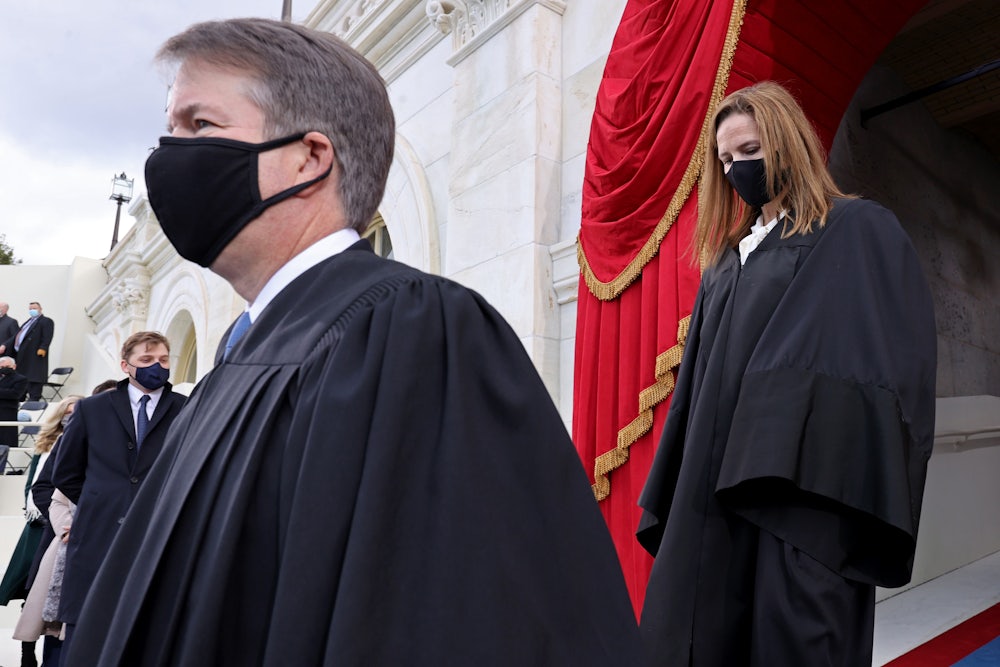The Supreme Court announced on Monday that it will reconsider part of Roe v. Wade in its fall term, setting the stage for a major ruling to curtail access to legal abortion throughout America. The justices have not heard a direct challenge to Roe since a troika of moderates saved its central holdings in Planned Parenthood v. Casey in 1992. Now the court’s moderates are all gone, and the only thing that can stop the conservatives from demolishing Roe is themselves.
Monday’s announcement amounted to an existential threat to abortion rights across large portions of the country. “The Supreme Court’s decision to review this unconstitutional ban is an ominous sign and an alarming reminder that the threat to the legal right to abortion is imminent and real,” NARAL Pro-Choice America’s Christian LoBue said in a statement on Monday. “If Roe v. Wade were to fall as a result of this case, states across the country are poised to ban abortion.”
If the Supreme Court overturns Roe, each state would be free to enact its own laws on abortion. States like California and New York would almost certainly maintain laws that allow women to obtain abortions in most circumstances. A few states already have so-called “trigger laws” that automatically ban the procedure in the event that Roe is overturned. In 2020, an analysis in The New York Times estimated that at least 22 states would likely make abortion illegal without Roe.
The case itself, Dobbs v. Jackson Women’s Health Organization, revolves around a Mississippi law passed in 2018. The state banned elective abortions after 15 weeks of gestation in what amounted to one of the strictest restrictions on abortion rights in the nation. It was also flatly defiant of existing Supreme Court precedent. In Casey, the court held that “before viability, the state’s interests are not strong enough to support a prohibition of abortion.”
The defiance was the point. After passing the law, Mississippi made only a minimal effort to defend it in court on the merits. The Jackson Women’s Health Organization quickly filed a lawsuit in federal to block the law from going into effect, arguing that the state had flatly defied the Supreme Court’s abortion-related precedents. Judge Carlton Reeves agreed and issued an order in November 2018 to block the law from taking effect. At the same time, he chastised the state for its approach to the litigation.
“The state concedes that plaintiffs’ articulation of the relevant facts is correct, and it cannot provide any controlling law that requires this court to consider other facts,” Reeves wrote in his order. “The only other explanation in its brief is that the state is making a deliberate effort to overturn Roe and established constitutional precedent. With the recent changes in the membership of the Supreme Court, it may be that the state believes that divine providence covered the Capitol when it passed this legislation. Time will tell. If overturning Roe is this state’s desired result, the state will have to seek that relief from a higher court.”
The Fifth Circuit Court of Appeals upheld Reeves’s order in 2019, agreeing that the district court’s decision was bound by Supreme Court precedent. “A good faith reading of those precedents requires us to affirm,” Judge James Ho wrote in a concurring opinion. “Tellingly, the able counsel who brought this appeal on behalf of the state of Mississippi did not even request oral argument, notwithstanding the high stakes for their clients—the constitutionality of a recent enactment of profound moral significance to the citizens of Mississippi. That omission makes no sense but for the fact that Supreme Court precedent requires affirmance.”
Mississippi is one of a number of GOP-led states that passed broad restrictions on abortion over the last few years despite the Supreme Court’s rulings. After Anthony Kennedy retired in 2018, those efforts gathered steam. Kennedy was the last serving member of the Casey troika, along with Sandra Day O’Connor and David Souter. He preserved a tenuous status quo for abortion rights that endured over the last 30 years since Casey. With his departure under a Republican president, a substantive move against abortion rights was almost inevitable.
In its order on Monday, the Supreme Court declined to hear two ancillary aspects of the case. Mississippi’s petition also asked the justices to decide whether abortion clinics could file lawsuits on behalf of their patients, a long-established exception to the general rule that third parties typically can’t file lawsuits to vindicate another person’s rights. The state also asked the court to consider whether the state law should be analyzed under the framework outlined in Casey or under the one laid out in Whole Women’s Health v. Hellerstedt, which struck down a Texas law that would have closed many of the state’s abortion clinics. The court’s focus on the underlying question could reflect more sweeping ambitions than those procedural questions would address.
Predicting the outcomes of Supreme Court cases is fraught at best. But there are ample reasons to believe that this is the moment that anti-abortion groups have dreamed of—and abortion-rights groups have dreaded—for nearly a half-century. With Kennedy’s retirement in 2018 and Ruth Bader Ginsburg’s death in 2020, there are no longer five votes on the high court for the Roe-Casey status quo on abortion rights. Kavanaugh, who replaced Kennedy, has already voted with the court’s conservative bloc in favor of laws that restrict the procedure. Amy Coney Barrett, who replaced Ginsburg, often spoke out against abortion and Roe before becoming a federal judge. If her jurisprudential stance toward Roe differed from her personal beliefs about the ruling, it would be the greatest surprise in the history of American law.
Dobbs is also designed for no other outcome. As Reeves and the Fifth Circuit suggested, the Mississippi law exists to give the Supreme Court an opportunity to overturn Roe and Casey. There is also no other reason for the court’s conservative bloc to take up the case. There is no divide in the lower courts on whether the states can ban pre-viability abortions; they have uniformly ruled against such bans. And if the justices wished to preserve the status quo, they would have simply taken no action and let the lower courts’ rulings stand.
So how far could the Supreme Court go in this case? It’s possible that the justices will take the opportunity to wipe away Roe and Casey in one fell swoop, turning the clock back to 1973 and giving states free rein to allow or ban abortion as they see fit. Or they could simply allow pre-viability abortion bans and cast enough doubt on Roe in the ruling to finish the job in a future case. Either way, a 50-year era of nationwide legal abortion is almost certainly about to end.








